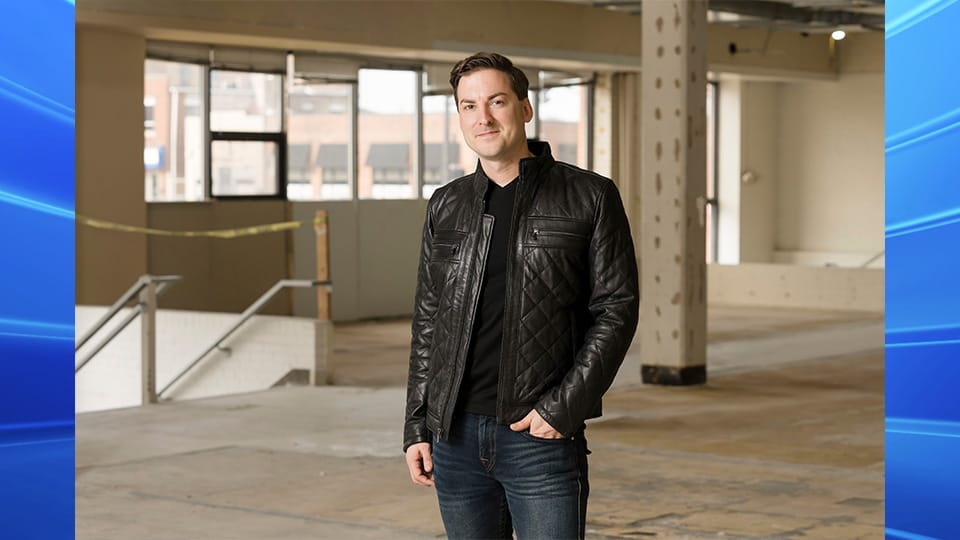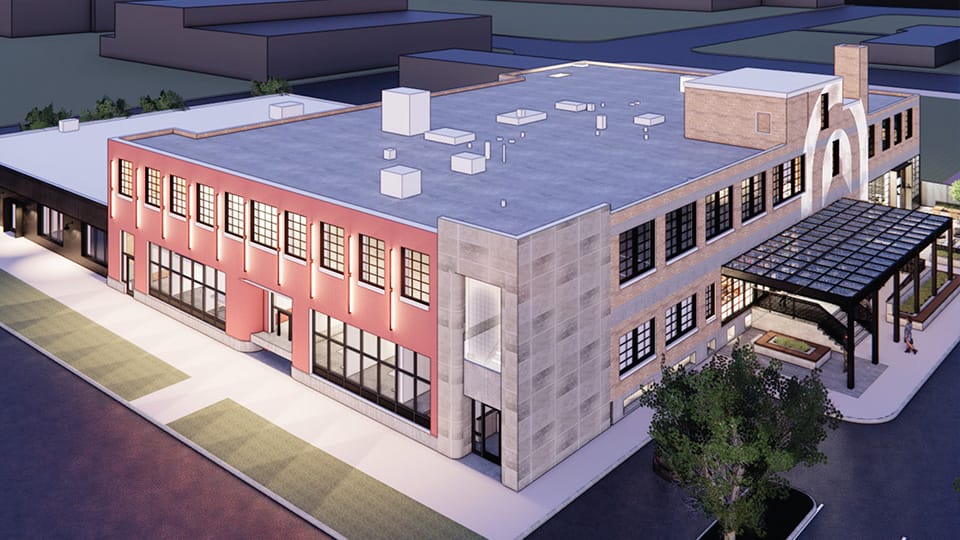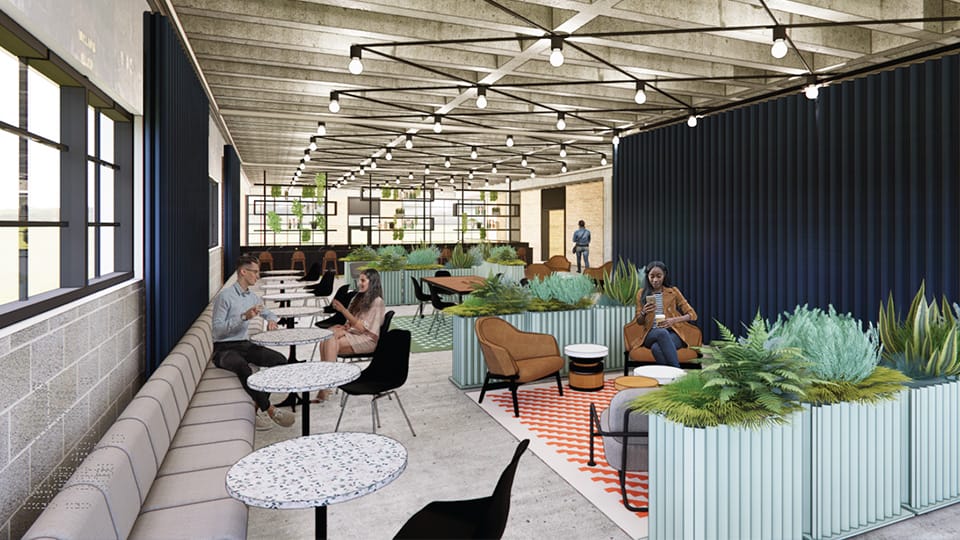Q&A with Kristopher Priemer of Momentum Entrepreneurship Hub
Subscriber Benefit
As a subscriber you can listen to articles at work, in the car, or while you work out. Subscribe Now
A South Bend entrepreneur has big plans to fill a gap in the region’s business ecosystem.
Later this year, Kristopher Priemer plans to open the doors to the Momentum Entrepreneurship Hub, which will serve as both a coworking and private office space while also functioning as a business accelerator.
Members will be able to take advantage of amenities like a gym, maternity room and game room. Business professionals also can grow their careers and businesses as part of a larger community, meeting similarly-minded people and attending Momentum events.
Working with local partners, Priemer hopes the project brings a new layer to the local community with both grant dollars and increased collaboration. The project was also brought to life using funding from the Regional Economic Acceleration and Development Initiative, or READI.
Pre-leasing will begin in two months with space becoming available sometime next December or January.
Premier spoke with Inside INdiana Business about the hub and its future. This interview has been edited for clarity and brevity.
What made you decide to create the Momentum Entrepreneurship Hub?
I bought two retail buildings from my dad about five or six years ago when he retired. It happened to be in the south end of downtown South Bend. I noticed there’s a lot of underutilized buildings in that part of town. During that time, I was also really involved with startups, really involved with the entrepreneurship ecosystem, mentoring some individual entrepreneurs, still having a good pulse on what was going on in that space. Similarly, from about 2016 to 2019, a couple friends and I, who were all kind of doing our separate things…we wanted to figure out how can we just hang out together on a frequent basis. It ended up becoming startup happy hours that we did every quarter. We did one and just tried to get together entrepreneurs so they could commiserate with each other, learn from each other or even maybe collaborate on future project ideas.
This specific building was being underutilized. I decided to do something about it. As I was talking to one of my mentors and friends—he and I had worked together at the city for a while doing some consulting work earlier—I had this idea: there’s this huge 60,000-square-foot building. I think I want to buy it and redevelop it. Because of the background that I had, and I’ve been to a lot of other cities and visited the amenities that they also had for their entrepreneurs, I was like we’re kind of missing this cool space that’s disconnected from any specific organization that entrepreneurs can come, they can rent office space, they can hang out, they can collaborate with other folks. [It’s] a place where they can find mentors, venture capital, resources and all kinds of having one cool, inspiring space.
Can you talk more about the space? What is it bringing to the South Bend ecosystem?
There’s a couple of pieces. One is trying to keep startups staying in our region. Whatever university the student might graduate from or even if they’re just someone who’s starting when they’re more experienced, often we’re finding that they then leave because we don’t have the resources or community to support them. That talent retention is one piece of it.
Another piece is angel investor activation. There’s all these small pockets of angel investors that may be active, may not be active. They don’t necessarily always know where to find the new startup that may be needing investments. I think the startup entrepreneurs don’t know where these other folks are either. To create a, for lack of a better term, a watering hole where someone can go there and know, “Oh, these are where the cool companies are. I want to either learn more about and might want to put money in.” Again, from an entrepreneur standpoint, they can have more interactions with those investors or mentors that they might want to bring on to their company.
What would someone get out of using the space? What is that experience going to be like?
The goal is that they go there and, not that they never want to leave, but we provide all the amenities for them. We provided all the tools that they need to be both be successful and also feel like they’re inspired to be successful. We did really a lot of research on what exists in other spaces up here in South Bend/Elkhart, but then also what doesn’t exist and what some of the community members said they wish did. When we put in, let’s say an indoor bike station, or we have the gym, we have a mother’s room, a meditation room. All of those are things we heard as we were kind of doing our listening tour and then we also saw in other spaces that were really robust and vibrant, that’s what we’re trying to create.
We’re trying to create a culture that robust and vibrant for the startup entrepreneurs so that they know that if they show up they might either always be meeting someone new, or there are going to be other people around that are like-minded, that are maybe going through similar challenges or going through different challenges that they could either help those folks with or they can learn from those folks.
This is something newer in the business ecosystem where people want these co-working collaborative spaces, especially after the pandemic, where people are working remotely more often. Can you talk about more why people want these spaces and to be a part of the culture that you mentioned?
I would say from my own experience: working at home can be lonely, and I think working at home when you’re an entrepreneur and you’re trying to start a new business can also be very lonely and difficult. You may think that you’re going through that on your own or that other people are having the same problems. It’s a frustrating and challenging experience. Even just that that commiserating and or having that support from other folks, you can’t get that if you’re at home. Now, the challenge is, how do you get people to come out of that safety circle? It’s creating, I think, the right amenities and spaces that people feel like they’re both comfortable, it’s welcoming, and it’s accessible; people don’t feel they’re not welcome. You also have some of those maybe nicer amenities that they don’t have at home: the Lux coffee bar and having snacks for them, talking about the gym. There’s other pieces that make it feel it’s also an elevated experience.
What’s it like working with the partners on this project and what they are bringing to the table?
From the beginning, we knew it was really important to A, not do it on your own, but B, we want to complement what’s already being done, and I would say C, offer things that maybe no one’s offering. These partners really come in on the programming side. We want the the entrepreneurs or the business owners to have programming so they can either learn new skills and participate in those pieces. That’s a large piece for these partners coming in. When we talk with La Casa and Juan over there of what he’s offering his members and what maybe the members needs are that he can’t fulfill, and it’s not in their mission to fulfill, but a lot of those come on the business side. How can we help fit in there a bit, whether it’s space where they can do programs in our space, or do we create a program that matches some of their needs? CDFI friendly is a little bit different. Sam’s offering certain services that will very much complement the entrepreneurs in our space. We want to make sure that he can connect with those folks, and find those folks. That the entrepreneurs can find him as well, that may be a good fit for his program, too.
It’s a little bit of resource centralization, and then if I’m trying to start a business, there’s so many things are difficult in that process. But, if I know if I go into the Momentum Entrepreneurship Club that I can find what I need that help with, we think that’s going to really transform how many we can get to stick around, or how many people we can get to be more successful over the next decade.
I saw on social media there is a lot of community overlap and support. Why is it important to assimilate local businesses and startups with the greater community?
It has to happen in order for this to be successful. If we’re kind of doing stuff in our own silo and what we wanted to create, it makes it a lot more challenging because we don’t believe “If you build it, they’ll come.” We need to make sure that we’re fulfilling the needs of the community and always making sure of also being a good partner ourselves. There’s other organizations that may need our help to do XYZ or participate or whatever it may be. We want them to know that they can come to us, and we can be just as much of a help.
I believe I know quite a bit about The Mill [in Bloomington] and met [Executive Director] Pat East of number of times. I think he gets out there a lot. We’re trying to follow his advice in a lot of different ways and make sure that we’re, again, not doing this in our own little private place. We want people to know it exists. We want people to be excited about it. We want people to not be able to wait for it.
What does the future look like for this space?
I wish we had space to build another building, but that’s, I think, three, five, 10 years down the line. I just think it’s going to be for our region the go-to place for, let’s say, the region entrepreneur to find what they need, again, from a mentor/resource/funding place. People who go in there are wowed by not only the design that we put together, but also just the people, the culture, the collaboration, and that it’s something that they did not know that we were missing, but now they know that we can’t live without it. I think that would be the ideal scenario of it just so robust and synonymous with entrepreneurship in our region that people like, oh, you go to momentum?




